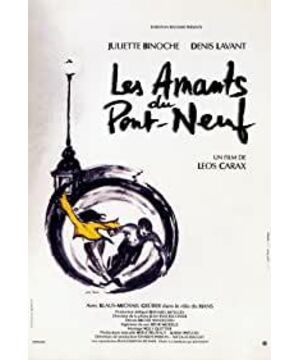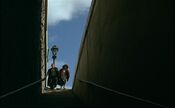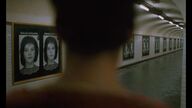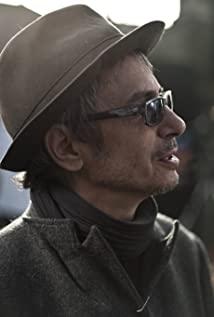——Michelle
When I first heard the heroine say this sentence by the sea, I vaguely felt it was what is prophesied. Now, when I look back on this movie again, I suddenly find that this simple line of dialogue has become the most perfect interpretation of the tragedy of their deep-rooted love. For someone who chooses self-imposed exile in the face of life's blows, it may not be surprising to meet a homeless, short-lived passion. But what if the battered person chooses to face life again? Will he still guard a homeless man who "looks only at his feet"?
The daughter of the upper class, for some reason, is sleeping and sleeping on an old bridge in Paris that is being repaired. She was in a very bad situation at this point: suffering from severe eye disease, and probably going blind soon; ragged and penniless (I don't know why I left the house, but from the later episodes, it is assumed that he ran away from home, and her The family is not bad); I don't know what kind of experience I have had, I only know that I just broke up, and I was silent in the pain of a failed love, and later even turned from love to hate, even killing my lover. It was in such a trance, helplessness, and pain that she met the hero, a vagabond who was equally painful and more confused.
Soon, the two empty hearts found solace in each other - and they began a passionate love affair. On the night of the Paris celebration, under the sky of fireworks, they drank, cheered, played, surfed, and exaggeratedly danced strange dances completely from their hearts, venting their feelings. They say strange things, live strange lives, and enjoy a happy life despite being at the bottom of society.
But the fairy tale did not usher in a happy ending because of the union of the prince and the princess. The tramp's paranoid love for Michelle limits her free heart. First of all, Michelle will use the money they earn to pursue a new life - she is not satisfied with sleeping on the "street side of the wind and rain" forever. But the tramp doesn't want to do this - he's afraid to change his current state, he's afraid to lose her. So, he borrowed Michelle's own hand to push the money box into the water - the money box that fell into the river was not just a few francs, it was Michelle's dream of pursuing a better life in the future! Later, on the night Michelle visited the museum, because he didn't know where Michelle was, he relied on frantic self-mutilation to vent his feelings. Immediately after, seeing the missing person notice in the subway station, he was afraid that Michelle would return to his own life, so he desperately destroyed those posters - the crazy behavior killed innocent people, and he eventually was punished. And the most shocking thing was that after confirming that Michelle had left, he brutally and frantically shot off his own finger and self-mutilated.
What kind of unforgettable memory can make it like this! However, this kind of extreme paranoid love could not save the beloved!
Just like the prophecy by the sea, Michelle who can't see the horizon is because of poor eyesight. And the homeless man who can't see the horizon is because he only looks at his feet. When Michelle's "eye disease" is serious (I think "eye disease" is a kind of self-exile living state that symbolizes Michelle's face of life blows), they may have a deep love, and once Michelle heals her eyes ——After regaining the confidence and reason she should have to face life, she will return to the upper class, pursue her dream, and end this deep-seated but unsustainable relationship. Only the homeless man who only looked at his feet was left.
In the end, although Michelle and the tramp meet again on the newly repaired bridge, will it be long? What awaits them behind the short-lived happiness...
View more about The Lovers on the Bridge reviews











